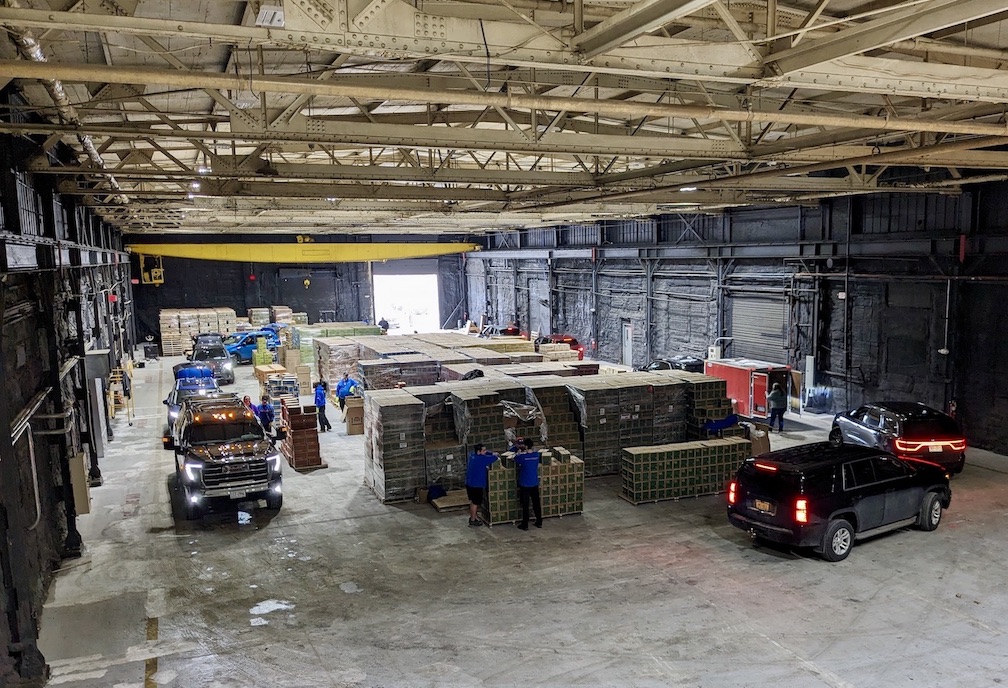Featured News - Current News - Archived News - News Categories
Hochul proposes an additional $1 billion be added to renamed ‘Clean Water, Clean Air and Green Jobs Environmental Bond Act’
√ Additional $10 million to help municipalities plan wastewater infrastructure upgrades, mitigate risk, and reduce system failures; $5 million more for green innovation projects
Gov. Kathy Hochul on Tuesday announced the availability of $600 million to communities statewide through the Water Infrastructure Improvement Act (WIIA), Water Quality Improvement Project (WQIP) Program, and Intermunicipal Grant (IMG) programs to fund projects to upgrade infrastructure and make communities more resilient to flooding and other impacts of severe storms and weather events.
A press release noted, “These grants will provide funding for water infrastructure projects that increase community resilience to flooding and are critical to protecting public health and the environment. In addition, the Publicly Owned Treatment Works Asset Management Program will make $10 million available to establish asset management programs that will help municipalities monitor, protect and responsibly plan upgrades for wastewater infrastructure systems, at no cost. An additional $5 million in Green Innovation Grant Program grant funding will be available to communities for green infrastructure to address stormwater, and water and energy efficiency. It is anticipated that jobs in the manufacturing, engineering, construction, plant operations and related industry sectors will be created as a result of this massive infusion of public funding.”
Hochul is directing agencies to work together to expedite the state's ability to invest in vital green infrastructure projects, and proposing to rename the “Clean Water, Clean Air and Green Jobs Environmental Bond Act” to recognize the urgency of the bond act investments; work with the Legislature to ensure this proposal; and ensure the Environmental Protection Fund, Clean Water Infrastructure Act and Environmental Agency spending are “appropriately structured” to advance the state's resiliency agenda to protect New Yorkers and the environment. In addition, the governor announced she would propose a $1 billion increase to the Clean Water, Clean Air and Green Jobs Environmental Bond Act, which will round out its total to $4 billion.
Hochul said, "It is critical that communities have the financial resources to advance shovel-ready projects that put people to work. These efforts will upgrade our infrastructure to make our communities more resilient to flooding and other climate impacts. The funding announced today will create jobs and advance essential water quality improvement projects across the state that will ensure that our public water systems are protected and we are better prepared for our changing climate.
“Assuring the delivery of safe drinking water is critical to the health and wellbeing of all New Yorkers and updating water infrastructure is a key component to achieving this. However, New York must make even greater investments in these vital infrastructure projects, which is why I will be proposing an additional $1 billion be added to the ‘Clean Water, Clean Air and Green Jobs Environmental Bond Act.’ As our state prepares for our new climate reality and to leverage federal infrastructure funding, I am committed to making sure we help our communities and keep our people and infrastructure protected."
New York State Department of Environmental Conservation Commissioner and Environmental Facilities Corp. Board Chair Basil Seggos said, "Recent storms Henri and Ida challenged municipal wastewater infrastructure like never before, underscoring the urgent need to strengthen New York's aging infrastructure. In the aftermath of these storms, Gov. Hochul was on the ground in some of the hardest-hit communities and saw the damage first-hand. The significant resources included in today's announcement underscore the governor's commitment to help ensure all of our communities have the resources and tools necessary to advance sustainable solutions and more resilient systems ready to safeguard water supplies, improve aging infrastructure, and be better prepared to withstand the next severe storm."
New York State Health Commissioner Dr. Howard Zucker said, "During times of extreme climate crisis, it is more important than ever to ensure safe and reliable access to clean drinking water with forward-thinking strategies to shore up outdated systems. As the regulator for New York's vast network of public drinking water systems – many of which are aging – the Department of Health looks forward to working with Gov. Hochul to continue to prioritize funding for these vital infrastructure projects in communities statewide."
Executive Director of Buffalo Niagara Waterkeeper Jill Jedlicka said, "New York is a Great Lakes state, and the health and protection of the world's largest freshwater system should be a top priority for our communities and economy. Gov. Hochul's commitment to our state's water resources and environment is exactly the kind of leadership we need to ensure climate resiliency as well as to accelerate much-needed investments into our aging water and sewer infrastructure, particularly in Western New York. Environmental and water resource protection is not a luxury, but a critical investment needed for the protection of our drinking water, ecosystems, and waterfront communities. We applaud the governor for her bold vision."
The Water Quality Improvement Project (WQIP) program is a DEC grant program that funds projects that directly address documented water quality impairments or protect a drinking water source. As part of the State's Environmental Protection Fund, WQIP projects improve water quality, reduces the potential for harmful algal blooms (HABs), and protect public drinking water across the state. Initiatives include land acquisition projects for source water protection, municipal wastewater treatment upgrades, nonagricultural nonpoint source abatement and control, salt storage, and aquatic habitat restoration, among others.
The Environmental Facilities Corp. will administer the WIIA and IMG programs to provide grants for wastewater and drinking water projects, working closely with the departments of Health and Environmental Conservation. The programs prioritize sewage treatment projects that improve water quality; and drinking water projects that address public health priorities, emerging contaminants and encourage local governments to work together on regional solutions.
Since the inception of the WIIA program in 2015, the state has released more than $1 billion in clean and drinking water grants through EFC, which includes more than $300 million in grants in 2019.
Local units of government are eligible to apply for funding for:
√ WIIA grant awards that will fund up to 25% of an eligible wastewater project's total cost, up to $25 million.
√ WIIA grant awards will fund up to 60% of an eligible drinking water project's total cost, up to $3 million.
√ IMG awards will fund up to 40% of an eligible wastewater or drinking water project for communities that share services, up to $30 million.
√ EC awards for projects addressing emerging contaminants above the state-determined maximum contaminant level (MCL) will fund 60% of net eligible project costs.
√ WQIP grant awards that will protect drinking water sources.
Communities can learn more about funding on EFC's and DEC's websites.
Publicly Owned Treatment Works Asset Management Program
$10 million will be available for asset management programs that will help municipalities “monitor, protect and responsibly plan” upgrades for their wastewater infrastructure facilities, free of charge. The statewide program will take a proactive approach to managing wastewater treatment facilities by providing engineering consultant services for software and technical training to local governments to map their sewer and wastewater systems using modern digital tools. Consulting services will also assist municipalities to inventory their wastewater assets and identify weaknesses in their current systems to promote repairs before a system failure occurs.
Hochul’s camp said, “The ability to minimize costly emergency repairs and prevent service disruptions will help protect public health and the environment by reducing the threat of pollution. The New York State Environmental Facilities Corp. will administer the program in partnership with DEC, which has regulatory oversight of wastewater facilities.
“The asset management program builds upon a successful $3 million pilot administered by DEC and EFC and completed in 2021 that helped 10 local governments throughout the state inventory their wastewater assets, identify risks to their wastewater infrastructure and determine cost-effective, tangible solutions to address issues. Up to an estimated 50 communities will be served under the next phase of this program.”
A request for qualifications (RFQ) will be released in the coming weeks to solicit professional engineering services that will allow EFC and DEC to hire the consultant engineers. The engineers will work with the communities to develop site-specific asset management programs, and the communities will also receive the software and training to maintain the programs on their own. It is expected that communities will be able to apply for the program in early 2022.
$20 million Green Infrastructure Grant Program
This program includes an additional $5 million more to be awarded from the submitted applications currently under review by EFC. The Green Innovation Grant Program (GIGP) supports projects across New York that utilize unique stormwater infrastructure design and create cutting-edge green technologies. Competitive grants are awarded annually to projects that improve water quality and mitigate the threat of climate change through the implementation of one or more of the following green practices including effects green stormwater infrastructure, energy efficiency, and water efficiency.





























